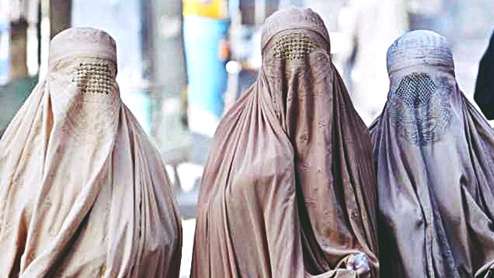
Burqa and Secularism
They (orthodox Muslims) are ready to cry foul when something happens in France while being supportive of Taliban oppression in our side of the world.
The recent ban imposed by France on Burqah (Full Veil) is generating a lot of reaction. The orthodox Muslims are expected to oppose it but their opposition is not what interests me. They are one hypocritical bunch of spineless people who are ready to cry foul when something happens in France while being supportive of Taliban oppression in our side of the world. They are more concerned about less than two thousand women who by the way have a choice to leave France and yet hypocritically silent over treatment which Muslim women receive in Muslim countries. A French law is hurting them more and yet far more oppressive and discriminatory laws against women in Muslim countries do not make them move an inch.
However at the same time the recent ban on Burqa has generated a lot of interesting debate on whether the step taken by France is true to the ideals of secularism and liberalism or not? But apart from that even the very concept of secularism particularly the way it is practised in France is under scrutiny. The ban opens a whole new philosophical debate on concepts like religious tolerance, freedom, the meaning of secularism and even liberalism. It is the ongoing debate between those who take liberal and secular positions which interests me and there is a lot of merit in discussing the issue in liberal and secular context.
According to one group, Burqah symbolizes religious oppression of women and is a relic of medieval times and therefore completely out of place in the Western world and particularly France which is a proud secular republic. Moreover they also supplement their argument that if someone immigrant is not comfortable then he/she should leave France. Their argument is further augmented by the fact that France bans ALL explicit religious symbols in schools. In fact in 2004, the new “secularity law” was passed with overwhelming support and a vote of 276 to 20. It bans the wearing of Muslim hijabs, Sikh’s head coverings, large Christian crosses or crucifixes, Jewish yarmulkes, etc.
The opposing group argues that secularism is by its essence separation of state and religion and it espouses religious freedom. If religious symbols and for that matter practices do not infringe upon the rights of others, then these should be allowed. Secularism according to them is not negation of religious freedom in the public sphere but rather separation of religion from the state. When liberalism is also thrown in, then the issue becomes even more critical because liberalism by its orientation advocates freedom provided it is not harmful to others. According to them if a woman is wearing a veil out of her own choice and is not compelled by the society then despite the apparent religiosity of Burqah and its historical symbolic association with oppression in some countries , she should be allowed to wear it. Just because Taliban have forced women to wear Burqah in Afghanistan does not mean that a woman in France is also being forced.
It is an interesting ethical dilemma where both the camps are busy indulging in name calling. If you belong to the former group you are blamed of being illiberal and confused about true meaning of secularism by the latter camp. On the other hand you earn yourself a title of closet conservative if you advocate the other point of view.
I think this debate is one of the most interesting one and needs deliberation without needless name calling. Because it is not just a stupid Burqah ( A confession: I hate Burqah) but the nature of secularism which is under scrutiny.
First I would like to acknowledge and admit that France is a sovereign country and has its own interpretation of secularism. It is fiercely protective about its version of secularism and there is an overwhelming consensus within the population about it. Moreover the French have not intentionally discriminated against Muslims as they have similar yardsticks for other religious symbols also. French law on secularity and conspicuous religious symbols in schools which was passed in 2004 banned explicit religious symbols Prohibited items included headscarves for Muslim girls, yarmulkes for Jewish boys, and turbans for Sikh boys. However, even then the most controversial element was the ban on hijab. The central issue has always been that Muslims are more sensitive when it comes to their religion. The recent ban and the accompanying reaction also prove the same. Let’s not forget that the ban on full face veil actually affects less than 2,000 women and yet it is evoking a strong response. I do not think that French have discriminated against Muslims intentionally; it is their interpretation of secularism coupled with the fact that a full face veil has been common in those countries where women are treated as a mere commodity. The association of full face veil with oppression of women is extremely strong and may have had a strong influence in shaping up the current bill which bans such veils. Apparently French have their reasons and within the context of their own interpretation of secularism, they have not done an inconsistent thing. So the allegation that they are discriminatory against Muslims does not hold much water
However, having said so I would also like to add that I personally do not agree with French model of secularism though I acknowledge their right to impose it in their own country. I think that secularism has to blend in with liberalism. French model of secularism is not essentially liberal at least when it comes to religious beliefs. I would rather prefer the US model which is liberal as well as secular when it comes to religion. The US bills of Rights and particularly the first amendment are excellent examples of how to achieve a very delicate balance between religious freedom and secularism. I think use of religious symbols provided these do not infringe upon the freedom of others, should be allowed. If a woman is WILLINGLY wearing Burqah, (and in Western countries majority of those who wear Burqah, do so out of choice) then she should be allowed. Yes veil may have been a symbol of oppression in some countries but symbols assume their relevance according to the circumstances. A full veil in Afghanistan may be a forced thing but a veil in USA is less likely to be the same thing. And if a veil is being forced in USA then being an open society with better human right record, the woman has full recourse to law and state’s protection.
Secularism has to blend in with religious freedom and tolerance and only then it can be a true liberal version of secularism. The French brand of secularism will not make the concept of secularism popular and will not work in a pluralistic society. It will rather defame and further intensify the confusions surrounding the concept of secularism. This is not to suggest that Muslim countries have credible record compared to France when it comes to minorities as they fare much much worse but at the same time it does raise a question whether France’s secular model is the optimal approach towards achieving a delicate balance between religious freedom and secularism.
Let’s not forget that French laws have been criticized by Human Rights Watch and other organizations also. For example, the Human Rights Watch had the following opinion about the 2004 French law on secularity and conspicuous religious symbols:
“The proposed French law banning Islamic headscarves and other visible religious symbols in state schools would violate the rights to freedom of religion and expression. Under international law, states can only limit religious practices when there is a compelling public safety reason, when the manifestation of religious beliefs would impinge on the rights of others, or when it serves a legitimate educational function (such as prohibiting practices that preclude student-teacher interaction). Muslim headscarves, Sikh turbans, Jewish skullcaps and large Christian crosses—which are among the visible religious symbols that would be prohibited—do not pose a threat to public health, order or morals; they have no effect on the fundamental rights and freedoms of other students; and they do not undermine a school’s educational function.”
As the globe becomes more cosmopolitan, it becomes even more important to get our balance right. And a correct balance is what underpins liberal brand of secularism.







![Kuch Ishq Kiya, Kuch Kaam Kiya [Ishq Aur Kaam] - Faiz Ahmed Faiz](https://www.ravimagazine.com/wp-content/uploads/2015/03/faiz-461x245.jpg)






